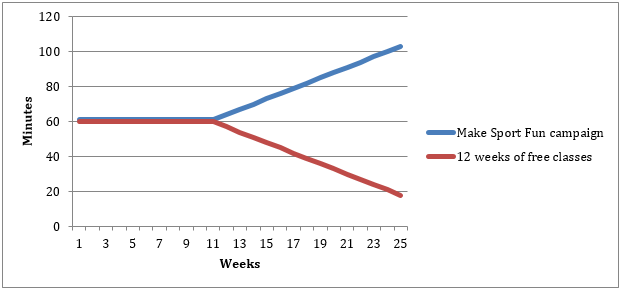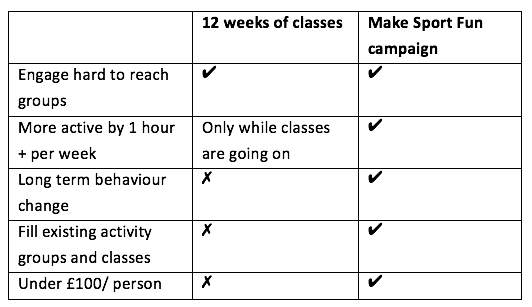Do you struggle to reach your target audience?
Do you find it frustrating trying to engage hard-to-reach audiences such as women and girls, disabled people, over 65s and people from lower socio-economic groups. You might find that you’re putting on new activity sessions only to have the same people turning up, instead of the inactive people you’re trying to reach. And that people ask for a certain session, but then don’t turn up, even though it’s what they say they want.
![]()
You don’t need to put on more activities. You need better to engage your audience
You’ve already done a great job and have made sure that there are a wide range of great activities in diverse places at affordable prices. Now you want to make people aware of what is out there. You need to match people with the right opportunity for them. After all 52% of people already want to be more active (Active People Survey).
Effective engagement programmes can get your target audience more active
Effective engagement programmes use marketing and behaviour change techniques to engage your hard-to-reach groups and support them to get more active. They are based on the most up-to-date insight and research available, and have a proven track record of engaging hard-to-reach audiences.
For example – In a project we’re running for Chichester Council we have engaged 814 over-65s from deprived areas of Chichester, and supported them to get more active. 60% of them are more active at 6 months than at registration, and their activity levels have gone up by an average of 1.5 hours a week. This approach works.
If you have any questions about planning your campaign email John Ainsworth john@makesportfun.com or call on 07776 103 785.
![]()
How we engage your target audience
To engage your target audience we follow a proven six-stage process.
- Planning – We analyse local data to identify what segments you should be targeting, how to reach them and what budget you’ll need.
- Set up – We set up ways for people to register; the right offer to engage them; a CRM system to track who’s registered and when they need following up with; an activity database; and (if appropriate) a campaign website.
- Promotion – We run promotion to find people who want to get active and get them to register their interest. We tailor the messages so the target audience will respond and use marketing techniques that will engage them. Techniques we use include direct mail, Google Ads and Facebook Ads.
- Behaviour change intervention – We follow up with people who’ve registered by phone, email and post, and find them somewhere to do an activity of their choice on a day and at a time that suits them within 20 minutes of where they live or work. We use a motivational interviewing approach, and provide a voucher so they can try the activity free the first time. This means the people we’ve engaged will actually try the activity.
- Activity – People then go off and try their new activity. Ideally their first experience will be fun, free and friendly.
- Follow up– We stay in touch with people via phone, email, text message and direct mail, address any barriers and issues and offer further motivation and support to keep them active. This lasts for 12 months to ensure long term increases in participation.
For more information on our 6 stage model take a look at our simple to follow infographic, or sign up for our free introduction to marketing sport and activity email course.
“Make Sport Fun offer everything that marketing should encompass, not just what people believe marketing is. That includes understanding how to change people’s behaviour, segmenting your audience, understanding your audience and their motivations, barriers and beliefs, how to tailor your message to them and what marketing tactics to use.”
Justin Webb, Engagement Manager, Macmillan Cancer Support
An up-to-date, scientific, evidence-based approach
We base all our work on the latest scientific evidence into marketing and behaviour change, so you know that your work will be cutting edge, and using the latest techniques, and will therefore have the biggest increase in participation possible. This research includes:
- Sport England segmentation
- Department of Health segmentation qualitative insight
- Active People Survey
- Health Survey for England
- Research into marketing via workplaces
- Research into marketing to cancer survivors
- Research into marketing to young women from lower socio-economic areas
- Work from top sport and activity academics such as Louise Mansfield (Deputy Director at Brunel University Centre for Sport, Health and Wellbeing) and Nick Cavill (Director, Cavill Associates)
We also test and track every element of every campaign we run. All this means that we’re able to bring the latest, cutting-edge research into play in your campaign.
“Your proposal was so much more innovative than anything else that we received. Than anything that’s being done in West Sussex.”
Elaine Thomas, Community Wellbeing Manager Chichester District Council
“You’re the fountain of knowledge about all things marketing sport to people. When I told the team you’d already done work in the exact area that we were working on they were convinced.”
Lorna Leach, Coaching and Volunteering Officer, London Sport
Our engagement programmes include behaviour change support to get people active long term
If you are using the standard approach of 12 weeks of free activity sessions followed by a basic “signposting” service then you may have realised that this isn’t leading to long term behaviour change. NICE guidance on Exercise on Referral shows that if you use this approach then people’s activity levels will dip immediately after the 12 weeks of sessions finish, and will then gradually decline. So you can’t achieve long term behaviour change with this approach.
But study after study has shown that even hard-to-reach groups will pay for activities if they’re sufficiently engaged. And an effective marketing and behaviour change campaign will engage your target audience and get them into existing activities.
We use behaviour change techniques as identified by NICE behaviour change guidance (PH6 and PH49) NICE physical activity guidelines (PH2 and PH41) and UCL’s analysis of 40 behaviour change techniques which can increase participation in physical activity.
This approach means that people will be attending an existing session that’s not going to stop running, so they’ll be active for longer. It also makes the activities sustainable, so you don’t need to fund them.
Activity levels over time
That’s why we provide members of the public with 12 months of support and interaction. This means you will have a long-term increase in participation rather than just a short-term spike.
Demand led
We always use local insight to make sure that our campaigns are demand led, so you’re guaranteed that the work we do will be tailored to the needs of the local community.
This starts with us using Sport England’s segmentation data to analyse the segmentation profile of your area, next we conduct insight research with your target population and finally we personalise the support to each individual.
Measurable results
We track the effectiveness of all our programmes using industry-standard physical activity evaluation tools, so you’ll know exactly how many people are more active and how much more active they are.
Comparison of our approach with 12 weeks of classes
![]()
Pricing
Marketing and behaviour change campaigns are very cost effective when compared with putting on new activities for free. Studies by NICE found that Exercise on Referral costs £150 per person or more for the facility, coach and the staff organising it.
The approach we use costs from £40 per person depending on what audience you want to reach.
Under 16s – £80 per person
16-65 year olds – £40 per person
Over 65s – £81 per person
Campaigns cost from £14,999 + VAT.
![]()
Get in touch
If you have any questions about engagement programmes please email John Ainsworth john@makesportfun.com or call on 07776 103 785.
If you’re not ready to get in touch, but would like to learn more about how this approach can engage your target audience then sign up for our free Introduction to Physical Activity Engagement Programmes email course.


